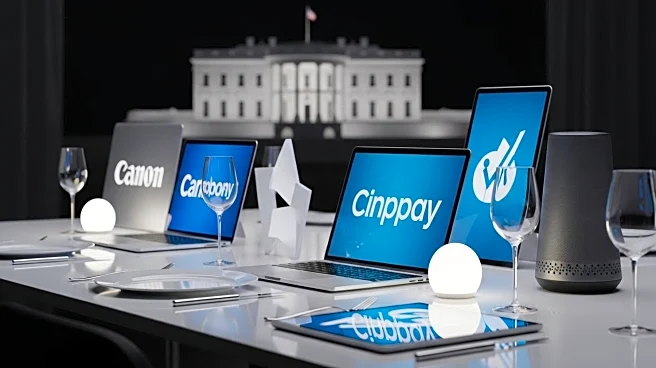What is the story about?
What's Happening?
President Trump hosted a dinner at the White House with prominent Big Tech leaders, including Mark Zuckerberg, Bill Gates, and Tim Cook. The event, partially broadcast on C-SPAN, showcased the close relationship between Trump's administration and the tech industry. During the dinner, Trump inquired about the executives' investment plans in the United States, prompting them to express their commitment to substantial financial contributions. Zuckerberg announced Meta's plan to invest $600 billion in U.S. infrastructure by 2028. Other executives, such as Sundar Pichai and Lisa Su, praised the administration's AI policies, while Tim Cook highlighted Apple's $600 billion investment in U.S. manufacturing, made under the threat of tariffs.
Why It's Important?
The dinner underscores the significant influence of Big Tech on U.S. economic and political landscapes. The pledges of investment from these companies could lead to substantial job creation and technological advancements within the country. However, the event also raises questions about the power dynamics between the government and major corporations, as well as the potential implications for public policy and regulatory frameworks. The alignment of Big Tech with Trump's administration may impact future legislative decisions, particularly concerning technology and innovation.
What's Next?
The commitments made by Big Tech leaders at the dinner are likely to lead to increased scrutiny from policymakers and the public. As these companies expand their investments, they may face challenges related to regulatory compliance and public perception. The administration's AI initiatives could further shape the tech industry's trajectory, influencing areas such as workforce development and international competitiveness. Stakeholders, including political leaders and civil society groups, may respond with calls for transparency and accountability in these corporate-government interactions.
Beyond the Headlines
The event highlights ethical considerations regarding the influence of corporate power on democratic processes. The cozy relationship between Big Tech and the administration may prompt discussions about the role of technology companies in shaping public policy and societal norms. Long-term shifts in labor markets and economic structures could result from these investments, necessitating a reevaluation of workforce training and education strategies to adapt to technological advancements.
















